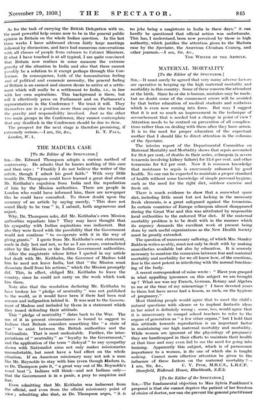THE MADURA CASE
[To the Editor of the SzEcTazoa.]
Sin,—Dr. Edward Thompson adopts a curious method of controversy. He admits that he knows nothing of this case and then says : "Frankly I do not believe the writer of the article, though I admit his good faith." With very little trouble Dr. Thompson could have learned a great deal about Mr. Keithahn's expulsion from India and the repudiation of him by the Mission authorities. There are people in London who could have informed him, there are newspaper files he could have consulted. To throw doubt upon the accuracy of an article by saying merely, "This does not sound likely to be true" is, I submit, both ungenerous and unjust.
Why, Dr. Thompson asks, did Mr. Keithalm's own Mission authorities repudiate him ? They may have thought that his sympathy with Indian aspirations was indiscreet. But also they were faced with the possibility that the Government would not continue "to co-operate with it in the way of giving grants." I quote from Mr. Keithahn's own statement, made in July last and not, so far as I am aware, contradicted either by the Mission or the Indian Government authorities.
After the magistrate whose letter I quoted in my article had dealt with Mr. Keithalm, the Governor of Madras told him he need not leave India, but that "the Mission must dissociate itself from his actions," which the Mission promptly did. This, in effect, obliged Mr. Keithahn to leave the country, since he could not carry on the work which took him there.
Note also that the resolution declaring Mr. Keithahn to have broken his "pledge of neutrality " was not published to the world, as it would have been if there had been real censure and indignation behind it. It was sent to the Govern- ment of Madras and included by them in a statement which they issued defending their attitude.
This "pledge of neutrality" dates back to the War. The use of it in present circumstances is bound to suggest to Indians that Britain considers something like "a state of war" to exist between the British authorities and the Nationalists. That is most undesirable. Further, the inter- pretations of " neutrality " as "loyalty to the Government," and the application of the term " disloyal " to any sympathy shown with Nationalist aims not only makes missionaries uncomfortable, but must have a bad effect on the whole situation. If an American missionary may not ask a man like Mr. Reynolds to stay with him (even though Madura is, as Dr. Thompson puts it, "a great way out of Mr. Reynolds's usual beat "), Indians will think—and not India' ns only— that the Government is in a panic, a prey to suspicion and fear.
Even admitting that Mr. Keithahn was indiscreet from the official, and even from the official missionary point of View; admitting also that, as Dr. Thompson urges, "it. is
no joke being a magistrate in India in these days," it can hardly be questioned that official action was unfortunate. This has, I understand, been now perceived by those in high authority, which justifies the attention given to the Madura case by the Spectator, the American Christian Century, and other journals.—I am, Sir, THE WRITER OF TILE ARTICLE.










































 Previous page
Previous page